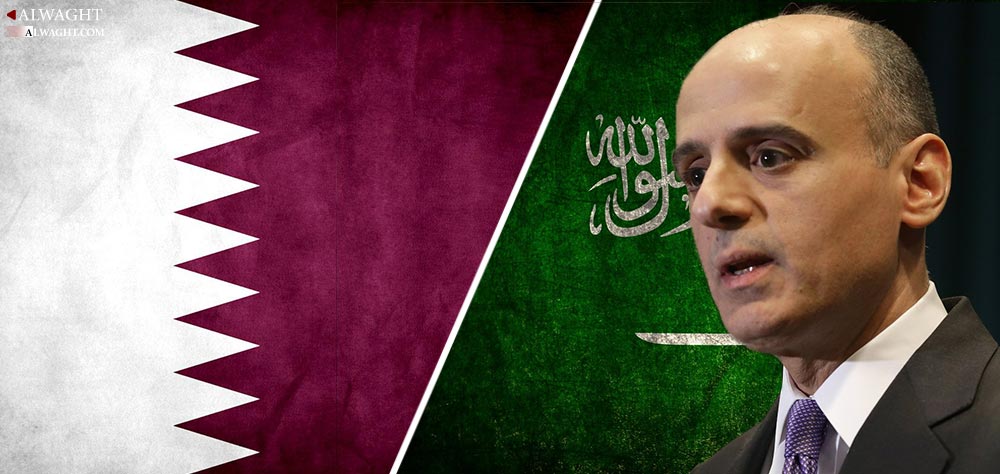Alwaght- Leading the kingdom’s delegation to New York to take part in the 72th United Nations General Assembly, the Saudi Foreign Minister Adel al-Jubeir met with the UN Secretary General Antonio Guterres and discussed the Persian Gulf Arab crisis. Al-Jubeir, calling the Qataris “brothers”, said the key for a solution to the crisis with the four Arab states— Saudi Arabia, UAE, Bahrain, and Egypt— was in the hands of the Qatar. With his tone towards Doha softened, the Saudi FM maintained that his country was ready to send medicine and food aids to Qatar.
Al-Jubeir’s remarks on Doha come while the British Secretary of State for Defense Michael Fallon visited Doha and met with the Qatari Prime Minister Abdullah bin Nasser bin Khalifa Al Thani. The British diplomat appreciated the Qatari role in the international anti-ISIS military coalition and noted that it was hard for the coalition to make gains against the terrorist group without Qatar's big facilitation that included use of its ports and sky for the military operations in both Syria and Iraq.
Many analysts understand the Saudi FM's remarks as an attempt to pave the way for restoration of relations with Qatar using the mediation of the Western sides. Sources talk about recent weeks' contacts between the Qatari Emir Tamim bin Hamad Al Thani and the Saudi Crown Prince Mohammad bin Salman who discussed the demands sent to Doha by the four Arab countries. The Qatari emir has reportedly agreed with the crown prince's offer to appoint two representatives from both sides to negotiate the differences between the two sides to seek a solution not contrary to any side’s national sovereignty.
What factors have pushed Saudi Arabia towards softening of approach to Qatar?
Qatar military purchases
Since the beginning of Qatar diplomatic row, the US has agreed to sell $12 billion worth of 36 American F-15 fighters to the Arab emirate. The deal was signed during June visit to Washington of the Qatari Secretary of State for Defense Khalid bin Mohammad Al Attiyah and his meeting with his American counterpart James Mattis. Furthermore, Al Attiyah is scheduled to visit Moscow for the International Military-Technical Forum Army-2017. Qatar and Russia are expected to sign two agreements on military-technical cooperation. Additionally, during the British secretary of defense’s visit to Doha, the two sides signed a deal for supplying to Qatar 24 Typhoon combat jets. The Qatari military spending sends a clear message to the sanctioning countries, telling them that not only Doha has no plans to give in to the pressures but also it is boosting its capabilities to respond to all scenarios including a military confrontation.
Qatar's economic potentials
Saudi Arabia, the analysts suggest, has made a mistake in its analysis of the Qatari power to economically resist the blockade. Doha has large-scale economic capabilities and thus can be put to work to help stand even long-term Saudi Arabia and its allies' economic siege. Qatar’s financial performance figures show that even if Doha is held under the Persian Gulf Arab states' embargo for several years, it can protect value of its national currency, a report by the Reuters news agency suggests. This means that it is quite unlikely that the value of Qatari riyal against dollar will be victim to the ongoing diplomatic crisis.
Saudi Arabia, UAE, Bahrain, and Egypt's blockading the small Persian Gulf monarchy from the sea, air, and ground might partially hurt the country’s trade balance and force capital and foreign investment out of its national economy, but the world’s biggest LNG (liquefied natural gas) exporter is wealthy enough to make up for the money fled the country by simply cashing only part of its financial reserves. Economists rule out that the emirate’s trade balance moves down to alarming levels as long as it is able to export gas. This heralds stability of the riyal value (3.64) against dollar without considerable change in sight.
Western and Turkish backing for Doha
The backing by Turkey, a NATO member state and rival to Saudi Arabia in the Muslim world, helps Qatar withstand the sanctions of four allied Arab states. The support, moreover, gives assurances to the Qatari leaders, telling them that they will have beside them such serious patrons as the Turks who will not allow Qatar to fall victim to the Saudi excesses.
Furthermore, the US has given a mix of paradoxical responses to the Qatari crisis, making clear to the Saudi leaders that they cannot cross certain red lines and damage Qatar as Washington wants the two countries beside it. The occasional American pressures on Doha, the analysts note, are simply tactical, meant by Washington to wrest economic benefits from Qatar.
West and Riyadh against Qatar closeness to Iran
The late May visit of the American President Donald Trump to Saudi Arabia pursued two goals: wresting money from the wealthy kingdom and forming an Anti-Iran coalition. But the Qatari rift not only foiled the alliance building plans but also cracked the bloc of the allies, with Qatar ending up moving towards Iran. Tehran, as its principal regional policy for friendly relationship with the neighbors, welcomed Doha in a bid to help the Qatari people avoid damages coming from all-out embargo. This move naturally prompted West and regional allies' concerns about closeness of an Arab state to their regional rival.
The above-mentioned factors give the idea that the anti-Qatari Saudi Arabian measures not only failed to give the intended results but also backfired with vast damages at least to the kingdom’s credibility. Now Riyadh is left powerless and devoid of essential role in the Arab world decision making. Seeing its pressure tools impractical against Qatar, the Arab kingdom looks to change its tough stances in dealing with Qatar.



























